Collective Strategy Development: Tesco plc Case Study Analysis
VerifiedAdded on 2021/02/18
|23
|9144
|70
Report
AI Summary
This report provides a comprehensive analysis of collective strategy development, using Tesco plc as a case study. It explores the political, social, ethical, and operational needs for common strategies between organizations and administrations, identifying methodologies for internal and international collaborative strategy development. The report examines key policy and strategy issues, the influence of various factors on collective strategy, and the resolution of tensions between organizational cultures and ethics. It also evaluates the use of strategic intelligence and contributes original thinking to the formulation of collective strategy. Furthermore, the analysis differentiates between individual organizational strategy and collective strategy, examining the links between aspirations of collective strategy and the ethical, cultural, and operational objectives of stakeholders. Finally, it provides a critical understanding of different organizational and methodological approaches to organizational and collective change, offering insights into how organizations can improve their impact on component organizations, administrations, and stakeholders.
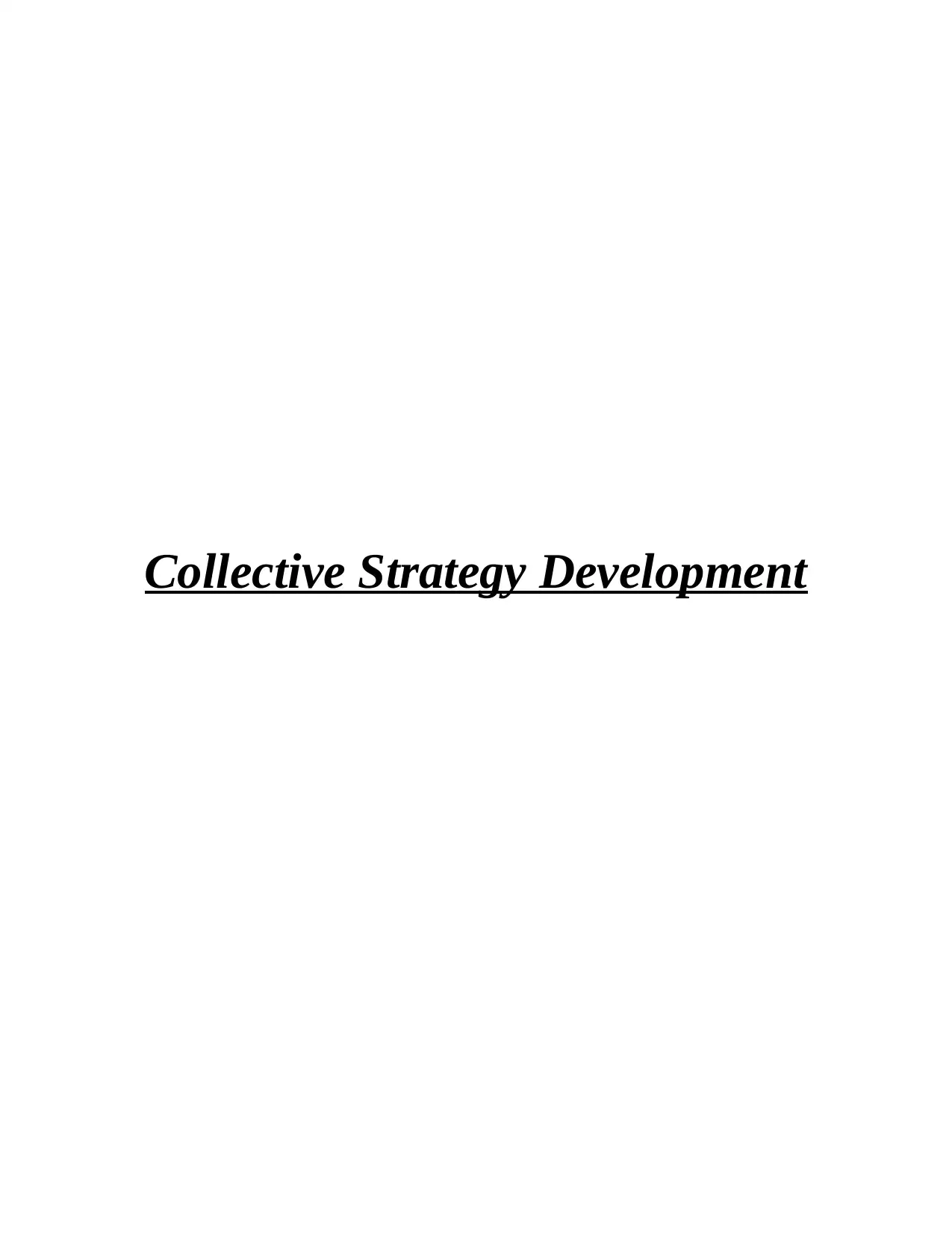
Collective Strategy Development
Paraphrase This Document
Need a fresh take? Get an instant paraphrase of this document with our AI Paraphraser

Table of Contents
INTRODUCTION...........................................................................................................................1
TASK 1............................................................................................................................................1
1.1. Political, social, ethical and operational needs for common strategies between
organisations and administrations..........................................................................................1
1.2. Identification of methodologies through which collective strategy is developed internally
within each organisation and externally international collaborative basis.............................3
1.3 Identification of opportunities for future development of collective strategies to improve
the impact on component organisations, administrations & stakeholders.............................5
TASK 2............................................................................................................................................7
2.1 Define collective strategy and consider how it is formed from the policies of the
component organisations, administrations and key stakeholders...........................................7
2.2 Identify the key policy and strategy issues which influence collective strategy..............8
2.3 Explain how collective strategy is influenced by the reality of factors – political, global,
public interest, media impact, and social, cultural, religious.................................................9
TASK 3..........................................................................................................................................11
3.1 Assess how to resolve the tensions between the cultures and ethics of contributing
organisations, administrations and key stakeholders............................................................11
3.2 Evaluate how strategic intelligence is used in the development and formulation of strategy
..............................................................................................................................................12
3.3 Contribute original knowledge and thinking to the formulation and development of
collective strategy.................................................................................................................13
TASK 4..........................................................................................................................................14
4.1 Analyse the differences between the aims and purposes of individual organisational
strategy and collective strategy............................................................................................14
4.2 Links between aspirations of collective strategy and ethical, cultural and operational
objectives of contributing organisations, administrations and stakeholders........................15
4.3 Critical understanding of different organisational, philosophical and methodological
approaches to organisational strategy affects organisational and collective change............17
CONCLUSION..............................................................................................................................18
INTRODUCTION...........................................................................................................................1
TASK 1............................................................................................................................................1
1.1. Political, social, ethical and operational needs for common strategies between
organisations and administrations..........................................................................................1
1.2. Identification of methodologies through which collective strategy is developed internally
within each organisation and externally international collaborative basis.............................3
1.3 Identification of opportunities for future development of collective strategies to improve
the impact on component organisations, administrations & stakeholders.............................5
TASK 2............................................................................................................................................7
2.1 Define collective strategy and consider how it is formed from the policies of the
component organisations, administrations and key stakeholders...........................................7
2.2 Identify the key policy and strategy issues which influence collective strategy..............8
2.3 Explain how collective strategy is influenced by the reality of factors – political, global,
public interest, media impact, and social, cultural, religious.................................................9
TASK 3..........................................................................................................................................11
3.1 Assess how to resolve the tensions between the cultures and ethics of contributing
organisations, administrations and key stakeholders............................................................11
3.2 Evaluate how strategic intelligence is used in the development and formulation of strategy
..............................................................................................................................................12
3.3 Contribute original knowledge and thinking to the formulation and development of
collective strategy.................................................................................................................13
TASK 4..........................................................................................................................................14
4.1 Analyse the differences between the aims and purposes of individual organisational
strategy and collective strategy............................................................................................14
4.2 Links between aspirations of collective strategy and ethical, cultural and operational
objectives of contributing organisations, administrations and stakeholders........................15
4.3 Critical understanding of different organisational, philosophical and methodological
approaches to organisational strategy affects organisational and collective change............17
CONCLUSION..............................................................................................................................18

REFERENCES..............................................................................................................................19
⊘ This is a preview!⊘
Do you want full access?
Subscribe today to unlock all pages.

Trusted by 1+ million students worldwide
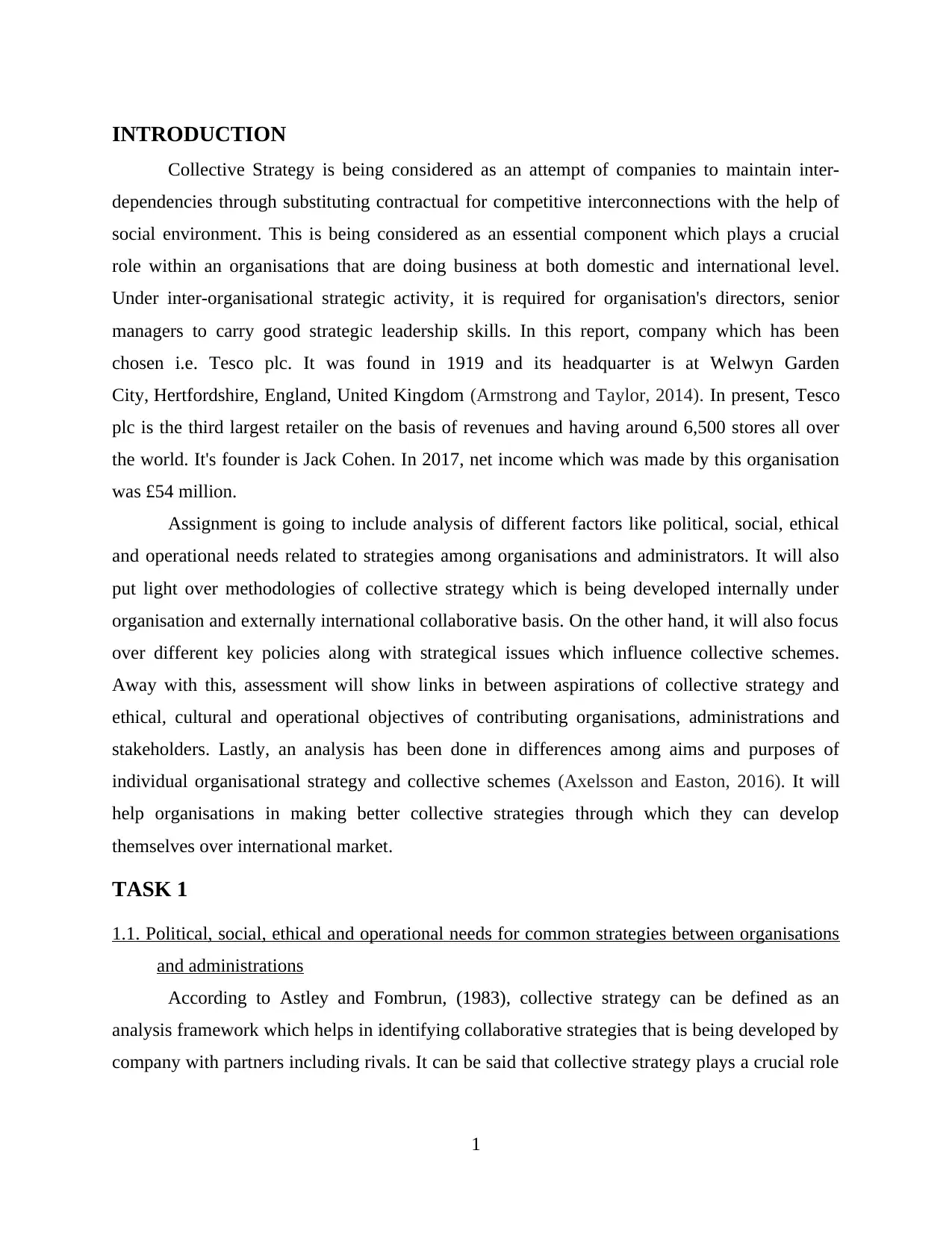
INTRODUCTION
Collective Strategy is being considered as an attempt of companies to maintain inter-
dependencies through substituting contractual for competitive interconnections with the help of
social environment. This is being considered as an essential component which plays a crucial
role within an organisations that are doing business at both domestic and international level.
Under inter-organisational strategic activity, it is required for organisation's directors, senior
managers to carry good strategic leadership skills. In this report, company which has been
chosen i.e. Tesco plc. It was found in 1919 and its headquarter is at Welwyn Garden
City, Hertfordshire, England, United Kingdom (Armstrong and Taylor, 2014). In present, Tesco
plc is the third largest retailer on the basis of revenues and having around 6,500 stores all over
the world. It's founder is Jack Cohen. In 2017, net income which was made by this organisation
was £54 million.
Assignment is going to include analysis of different factors like political, social, ethical
and operational needs related to strategies among organisations and administrators. It will also
put light over methodologies of collective strategy which is being developed internally under
organisation and externally international collaborative basis. On the other hand, it will also focus
over different key policies along with strategical issues which influence collective schemes.
Away with this, assessment will show links in between aspirations of collective strategy and
ethical, cultural and operational objectives of contributing organisations, administrations and
stakeholders. Lastly, an analysis has been done in differences among aims and purposes of
individual organisational strategy and collective schemes (Axelsson and Easton, 2016). It will
help organisations in making better collective strategies through which they can develop
themselves over international market.
TASK 1
1.1. Political, social, ethical and operational needs for common strategies between organisations
and administrations
According to Astley and Fombrun, (1983), collective strategy can be defined as an
analysis framework which helps in identifying collaborative strategies that is being developed by
company with partners including rivals. It can be said that collective strategy plays a crucial role
1
Collective Strategy is being considered as an attempt of companies to maintain inter-
dependencies through substituting contractual for competitive interconnections with the help of
social environment. This is being considered as an essential component which plays a crucial
role within an organisations that are doing business at both domestic and international level.
Under inter-organisational strategic activity, it is required for organisation's directors, senior
managers to carry good strategic leadership skills. In this report, company which has been
chosen i.e. Tesco plc. It was found in 1919 and its headquarter is at Welwyn Garden
City, Hertfordshire, England, United Kingdom (Armstrong and Taylor, 2014). In present, Tesco
plc is the third largest retailer on the basis of revenues and having around 6,500 stores all over
the world. It's founder is Jack Cohen. In 2017, net income which was made by this organisation
was £54 million.
Assignment is going to include analysis of different factors like political, social, ethical
and operational needs related to strategies among organisations and administrators. It will also
put light over methodologies of collective strategy which is being developed internally under
organisation and externally international collaborative basis. On the other hand, it will also focus
over different key policies along with strategical issues which influence collective schemes.
Away with this, assessment will show links in between aspirations of collective strategy and
ethical, cultural and operational objectives of contributing organisations, administrations and
stakeholders. Lastly, an analysis has been done in differences among aims and purposes of
individual organisational strategy and collective schemes (Axelsson and Easton, 2016). It will
help organisations in making better collective strategies through which they can develop
themselves over international market.
TASK 1
1.1. Political, social, ethical and operational needs for common strategies between organisations
and administrations
According to Astley and Fombrun, (1983), collective strategy can be defined as an
analysis framework which helps in identifying collaborative strategies that is being developed by
company with partners including rivals. It can be said that collective strategy plays a crucial role
1
Paraphrase This Document
Need a fresh take? Get an instant paraphrase of this document with our AI Paraphraser
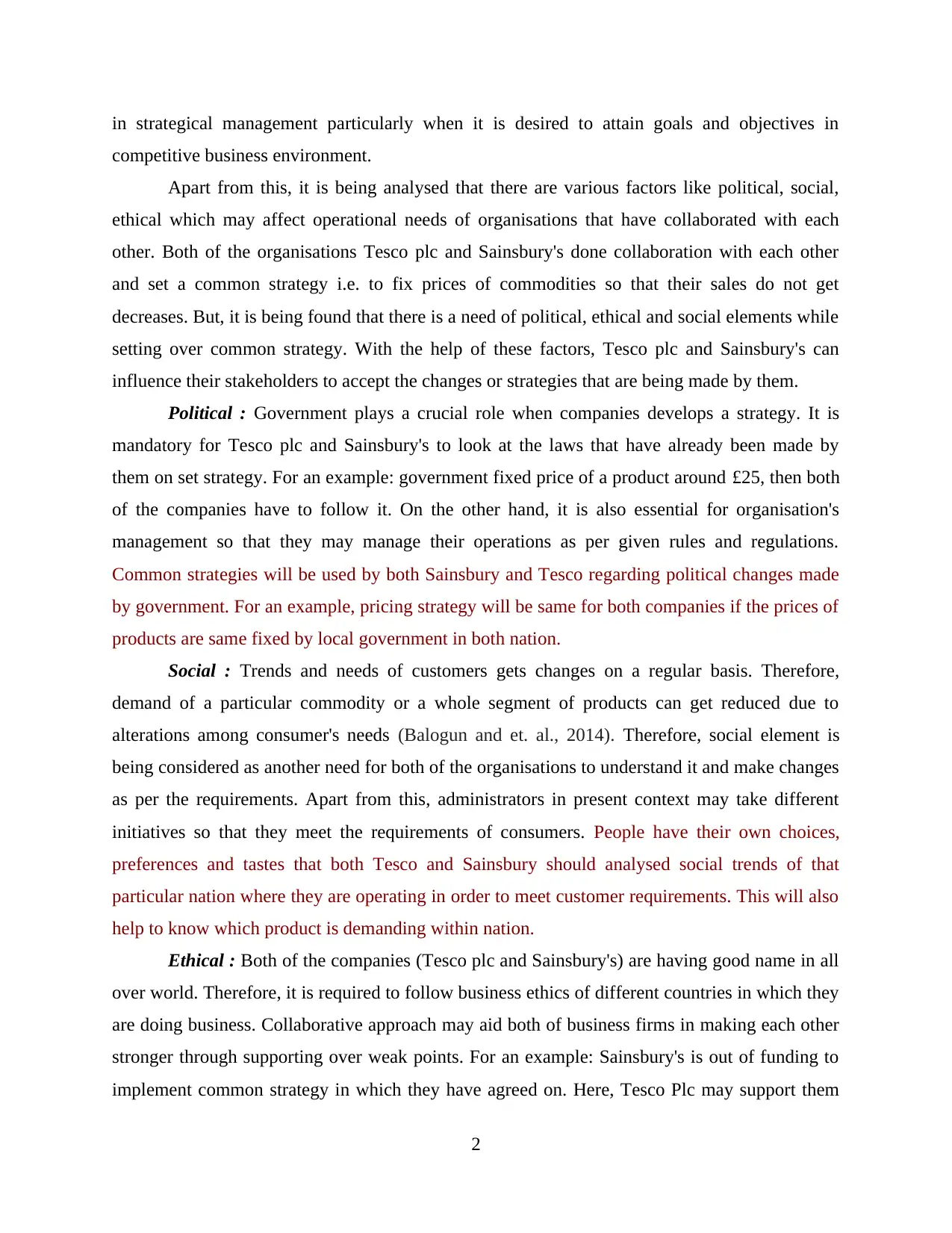
in strategical management particularly when it is desired to attain goals and objectives in
competitive business environment.
Apart from this, it is being analysed that there are various factors like political, social,
ethical which may affect operational needs of organisations that have collaborated with each
other. Both of the organisations Tesco plc and Sainsbury's done collaboration with each other
and set a common strategy i.e. to fix prices of commodities so that their sales do not get
decreases. But, it is being found that there is a need of political, ethical and social elements while
setting over common strategy. With the help of these factors, Tesco plc and Sainsbury's can
influence their stakeholders to accept the changes or strategies that are being made by them.
Political : Government plays a crucial role when companies develops a strategy. It is
mandatory for Tesco plc and Sainsbury's to look at the laws that have already been made by
them on set strategy. For an example: government fixed price of a product around £25, then both
of the companies have to follow it. On the other hand, it is also essential for organisation's
management so that they may manage their operations as per given rules and regulations.
Common strategies will be used by both Sainsbury and Tesco regarding political changes made
by government. For an example, pricing strategy will be same for both companies if the prices of
products are same fixed by local government in both nation.
Social : Trends and needs of customers gets changes on a regular basis. Therefore,
demand of a particular commodity or a whole segment of products can get reduced due to
alterations among consumer's needs (Balogun and et. al., 2014). Therefore, social element is
being considered as another need for both of the organisations to understand it and make changes
as per the requirements. Apart from this, administrators in present context may take different
initiatives so that they meet the requirements of consumers. People have their own choices,
preferences and tastes that both Tesco and Sainsbury should analysed social trends of that
particular nation where they are operating in order to meet customer requirements. This will also
help to know which product is demanding within nation.
Ethical : Both of the companies (Tesco plc and Sainsbury's) are having good name in all
over world. Therefore, it is required to follow business ethics of different countries in which they
are doing business. Collaborative approach may aid both of business firms in making each other
stronger through supporting over weak points. For an example: Sainsbury's is out of funding to
implement common strategy in which they have agreed on. Here, Tesco Plc may support them
2
competitive business environment.
Apart from this, it is being analysed that there are various factors like political, social,
ethical which may affect operational needs of organisations that have collaborated with each
other. Both of the organisations Tesco plc and Sainsbury's done collaboration with each other
and set a common strategy i.e. to fix prices of commodities so that their sales do not get
decreases. But, it is being found that there is a need of political, ethical and social elements while
setting over common strategy. With the help of these factors, Tesco plc and Sainsbury's can
influence their stakeholders to accept the changes or strategies that are being made by them.
Political : Government plays a crucial role when companies develops a strategy. It is
mandatory for Tesco plc and Sainsbury's to look at the laws that have already been made by
them on set strategy. For an example: government fixed price of a product around £25, then both
of the companies have to follow it. On the other hand, it is also essential for organisation's
management so that they may manage their operations as per given rules and regulations.
Common strategies will be used by both Sainsbury and Tesco regarding political changes made
by government. For an example, pricing strategy will be same for both companies if the prices of
products are same fixed by local government in both nation.
Social : Trends and needs of customers gets changes on a regular basis. Therefore,
demand of a particular commodity or a whole segment of products can get reduced due to
alterations among consumer's needs (Balogun and et. al., 2014). Therefore, social element is
being considered as another need for both of the organisations to understand it and make changes
as per the requirements. Apart from this, administrators in present context may take different
initiatives so that they meet the requirements of consumers. People have their own choices,
preferences and tastes that both Tesco and Sainsbury should analysed social trends of that
particular nation where they are operating in order to meet customer requirements. This will also
help to know which product is demanding within nation.
Ethical : Both of the companies (Tesco plc and Sainsbury's) are having good name in all
over world. Therefore, it is required to follow business ethics of different countries in which they
are doing business. Collaborative approach may aid both of business firms in making each other
stronger through supporting over weak points. For an example: Sainsbury's is out of funding to
implement common strategy in which they have agreed on. Here, Tesco Plc may support them
2
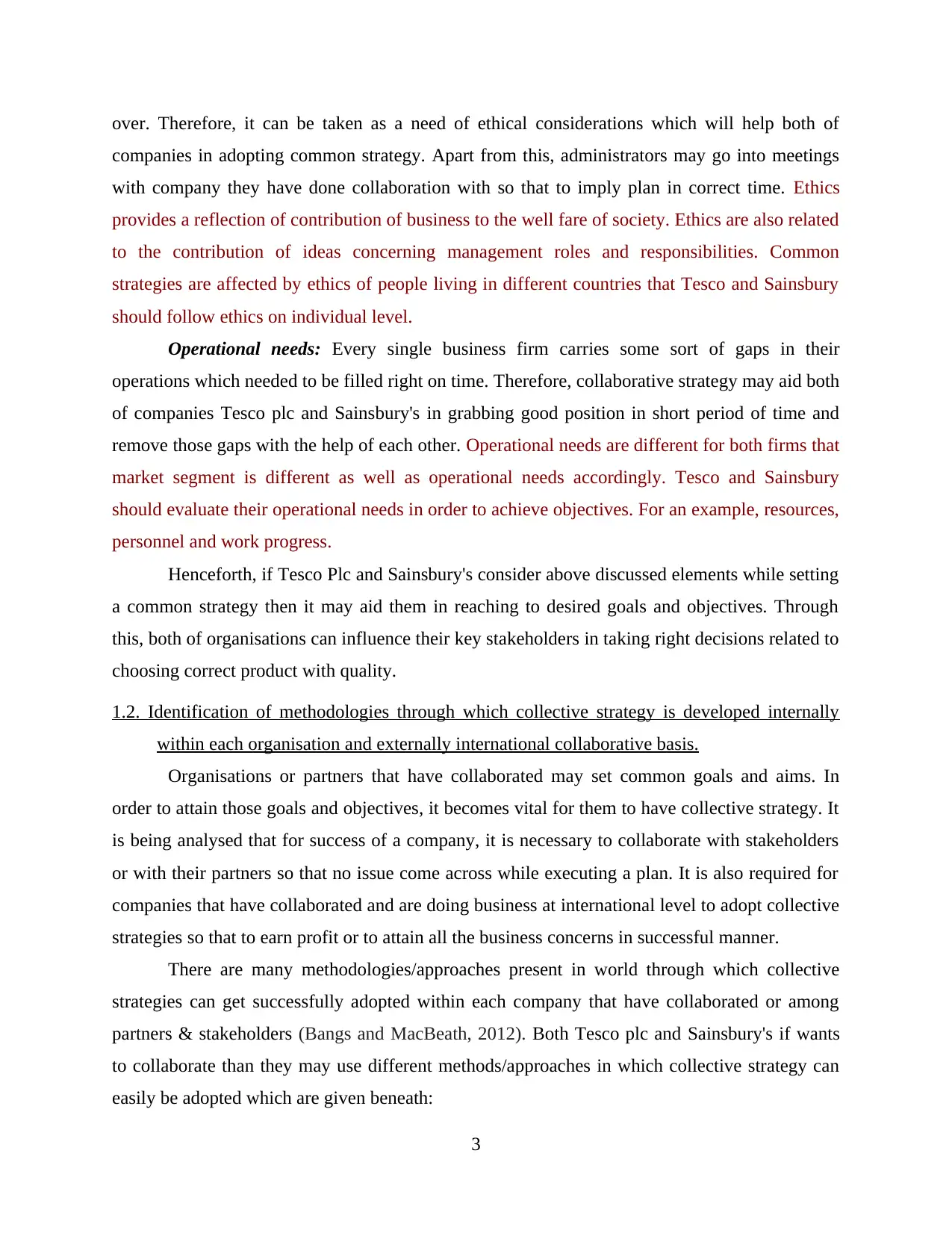
over. Therefore, it can be taken as a need of ethical considerations which will help both of
companies in adopting common strategy. Apart from this, administrators may go into meetings
with company they have done collaboration with so that to imply plan in correct time. Ethics
provides a reflection of contribution of business to the well fare of society. Ethics are also related
to the contribution of ideas concerning management roles and responsibilities. Common
strategies are affected by ethics of people living in different countries that Tesco and Sainsbury
should follow ethics on individual level.
Operational needs: Every single business firm carries some sort of gaps in their
operations which needed to be filled right on time. Therefore, collaborative strategy may aid both
of companies Tesco plc and Sainsbury's in grabbing good position in short period of time and
remove those gaps with the help of each other. Operational needs are different for both firms that
market segment is different as well as operational needs accordingly. Tesco and Sainsbury
should evaluate their operational needs in order to achieve objectives. For an example, resources,
personnel and work progress.
Henceforth, if Tesco Plc and Sainsbury's consider above discussed elements while setting
a common strategy then it may aid them in reaching to desired goals and objectives. Through
this, both of organisations can influence their key stakeholders in taking right decisions related to
choosing correct product with quality.
1.2. Identification of methodologies through which collective strategy is developed internally
within each organisation and externally international collaborative basis.
Organisations or partners that have collaborated may set common goals and aims. In
order to attain those goals and objectives, it becomes vital for them to have collective strategy. It
is being analysed that for success of a company, it is necessary to collaborate with stakeholders
or with their partners so that no issue come across while executing a plan. It is also required for
companies that have collaborated and are doing business at international level to adopt collective
strategies so that to earn profit or to attain all the business concerns in successful manner.
There are many methodologies/approaches present in world through which collective
strategies can get successfully adopted within each company that have collaborated or among
partners & stakeholders (Bangs and MacBeath, 2012). Both Tesco plc and Sainsbury's if wants
to collaborate than they may use different methods/approaches in which collective strategy can
easily be adopted which are given beneath:
3
companies in adopting common strategy. Apart from this, administrators may go into meetings
with company they have done collaboration with so that to imply plan in correct time. Ethics
provides a reflection of contribution of business to the well fare of society. Ethics are also related
to the contribution of ideas concerning management roles and responsibilities. Common
strategies are affected by ethics of people living in different countries that Tesco and Sainsbury
should follow ethics on individual level.
Operational needs: Every single business firm carries some sort of gaps in their
operations which needed to be filled right on time. Therefore, collaborative strategy may aid both
of companies Tesco plc and Sainsbury's in grabbing good position in short period of time and
remove those gaps with the help of each other. Operational needs are different for both firms that
market segment is different as well as operational needs accordingly. Tesco and Sainsbury
should evaluate their operational needs in order to achieve objectives. For an example, resources,
personnel and work progress.
Henceforth, if Tesco Plc and Sainsbury's consider above discussed elements while setting
a common strategy then it may aid them in reaching to desired goals and objectives. Through
this, both of organisations can influence their key stakeholders in taking right decisions related to
choosing correct product with quality.
1.2. Identification of methodologies through which collective strategy is developed internally
within each organisation and externally international collaborative basis.
Organisations or partners that have collaborated may set common goals and aims. In
order to attain those goals and objectives, it becomes vital for them to have collective strategy. It
is being analysed that for success of a company, it is necessary to collaborate with stakeholders
or with their partners so that no issue come across while executing a plan. It is also required for
companies that have collaborated and are doing business at international level to adopt collective
strategies so that to earn profit or to attain all the business concerns in successful manner.
There are many methodologies/approaches present in world through which collective
strategies can get successfully adopted within each company that have collaborated or among
partners & stakeholders (Bangs and MacBeath, 2012). Both Tesco plc and Sainsbury's if wants
to collaborate than they may use different methods/approaches in which collective strategy can
easily be adopted which are given beneath:
3
⊘ This is a preview!⊘
Do you want full access?
Subscribe today to unlock all pages.

Trusted by 1+ million students worldwide
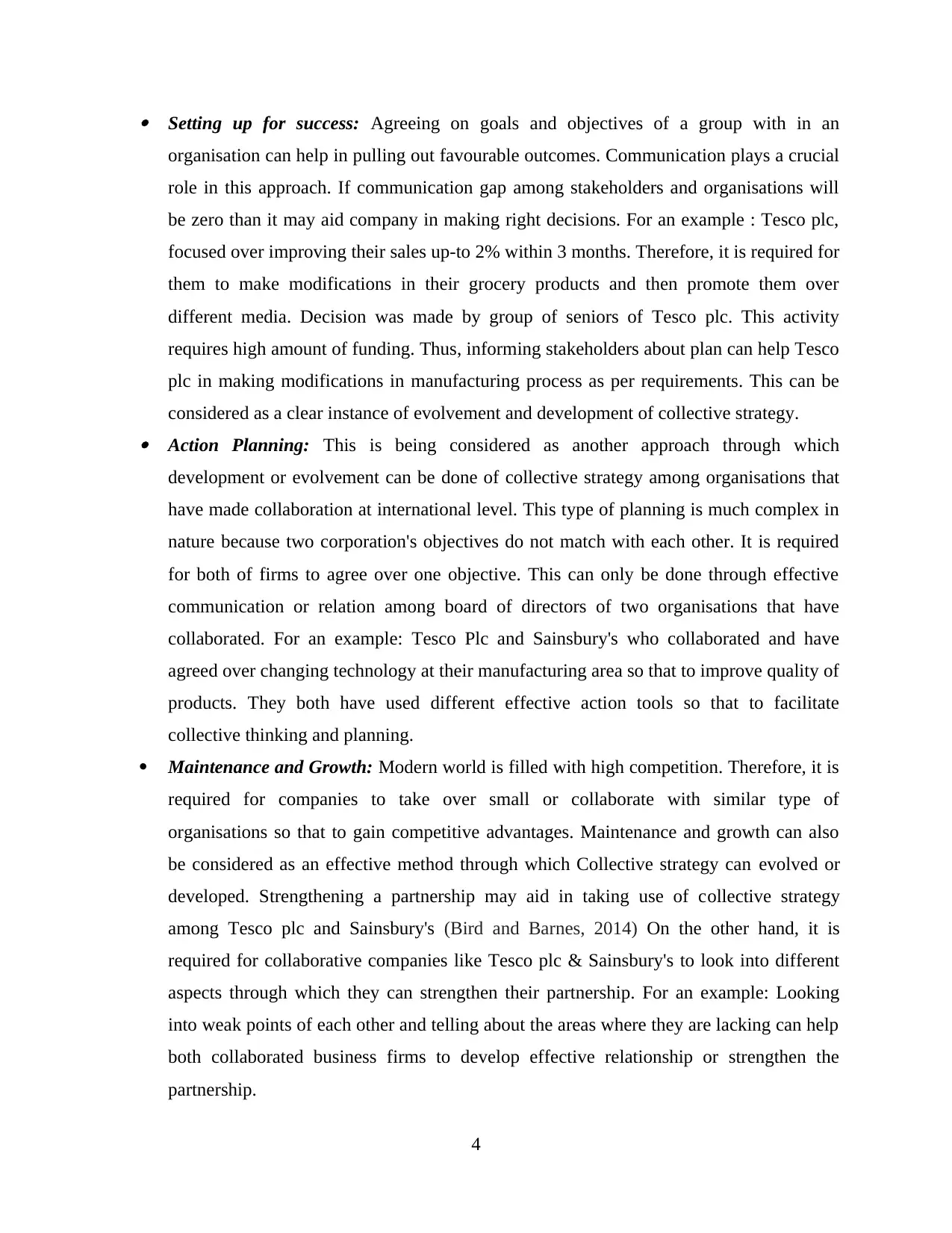
Setting up for success: Agreeing on goals and objectives of a group with in an
organisation can help in pulling out favourable outcomes. Communication plays a crucial
role in this approach. If communication gap among stakeholders and organisations will
be zero than it may aid company in making right decisions. For an example : Tesco plc,
focused over improving their sales up-to 2% within 3 months. Therefore, it is required for
them to make modifications in their grocery products and then promote them over
different media. Decision was made by group of seniors of Tesco plc. This activity
requires high amount of funding. Thus, informing stakeholders about plan can help Tesco
plc in making modifications in manufacturing process as per requirements. This can be
considered as a clear instance of evolvement and development of collective strategy. Action Planning: This is being considered as another approach through which
development or evolvement can be done of collective strategy among organisations that
have made collaboration at international level. This type of planning is much complex in
nature because two corporation's objectives do not match with each other. It is required
for both of firms to agree over one objective. This can only be done through effective
communication or relation among board of directors of two organisations that have
collaborated. For an example: Tesco Plc and Sainsbury's who collaborated and have
agreed over changing technology at their manufacturing area so that to improve quality of
products. They both have used different effective action tools so that to facilitate
collective thinking and planning.
Maintenance and Growth: Modern world is filled with high competition. Therefore, it is
required for companies to take over small or collaborate with similar type of
organisations so that to gain competitive advantages. Maintenance and growth can also
be considered as an effective method through which Collective strategy can evolved or
developed. Strengthening a partnership may aid in taking use of collective strategy
among Tesco plc and Sainsbury's (Bird and Barnes, 2014) On the other hand, it is
required for collaborative companies like Tesco plc & Sainsbury's to look into different
aspects through which they can strengthen their partnership. For an example: Looking
into weak points of each other and telling about the areas where they are lacking can help
both collaborated business firms to develop effective relationship or strengthen the
partnership.
4
organisation can help in pulling out favourable outcomes. Communication plays a crucial
role in this approach. If communication gap among stakeholders and organisations will
be zero than it may aid company in making right decisions. For an example : Tesco plc,
focused over improving their sales up-to 2% within 3 months. Therefore, it is required for
them to make modifications in their grocery products and then promote them over
different media. Decision was made by group of seniors of Tesco plc. This activity
requires high amount of funding. Thus, informing stakeholders about plan can help Tesco
plc in making modifications in manufacturing process as per requirements. This can be
considered as a clear instance of evolvement and development of collective strategy. Action Planning: This is being considered as another approach through which
development or evolvement can be done of collective strategy among organisations that
have made collaboration at international level. This type of planning is much complex in
nature because two corporation's objectives do not match with each other. It is required
for both of firms to agree over one objective. This can only be done through effective
communication or relation among board of directors of two organisations that have
collaborated. For an example: Tesco Plc and Sainsbury's who collaborated and have
agreed over changing technology at their manufacturing area so that to improve quality of
products. They both have used different effective action tools so that to facilitate
collective thinking and planning.
Maintenance and Growth: Modern world is filled with high competition. Therefore, it is
required for companies to take over small or collaborate with similar type of
organisations so that to gain competitive advantages. Maintenance and growth can also
be considered as an effective method through which Collective strategy can evolved or
developed. Strengthening a partnership may aid in taking use of collective strategy
among Tesco plc and Sainsbury's (Bird and Barnes, 2014) On the other hand, it is
required for collaborative companies like Tesco plc & Sainsbury's to look into different
aspects through which they can strengthen their partnership. For an example: Looking
into weak points of each other and telling about the areas where they are lacking can help
both collaborated business firms to develop effective relationship or strengthen the
partnership.
4
Paraphrase This Document
Need a fresh take? Get an instant paraphrase of this document with our AI Paraphraser
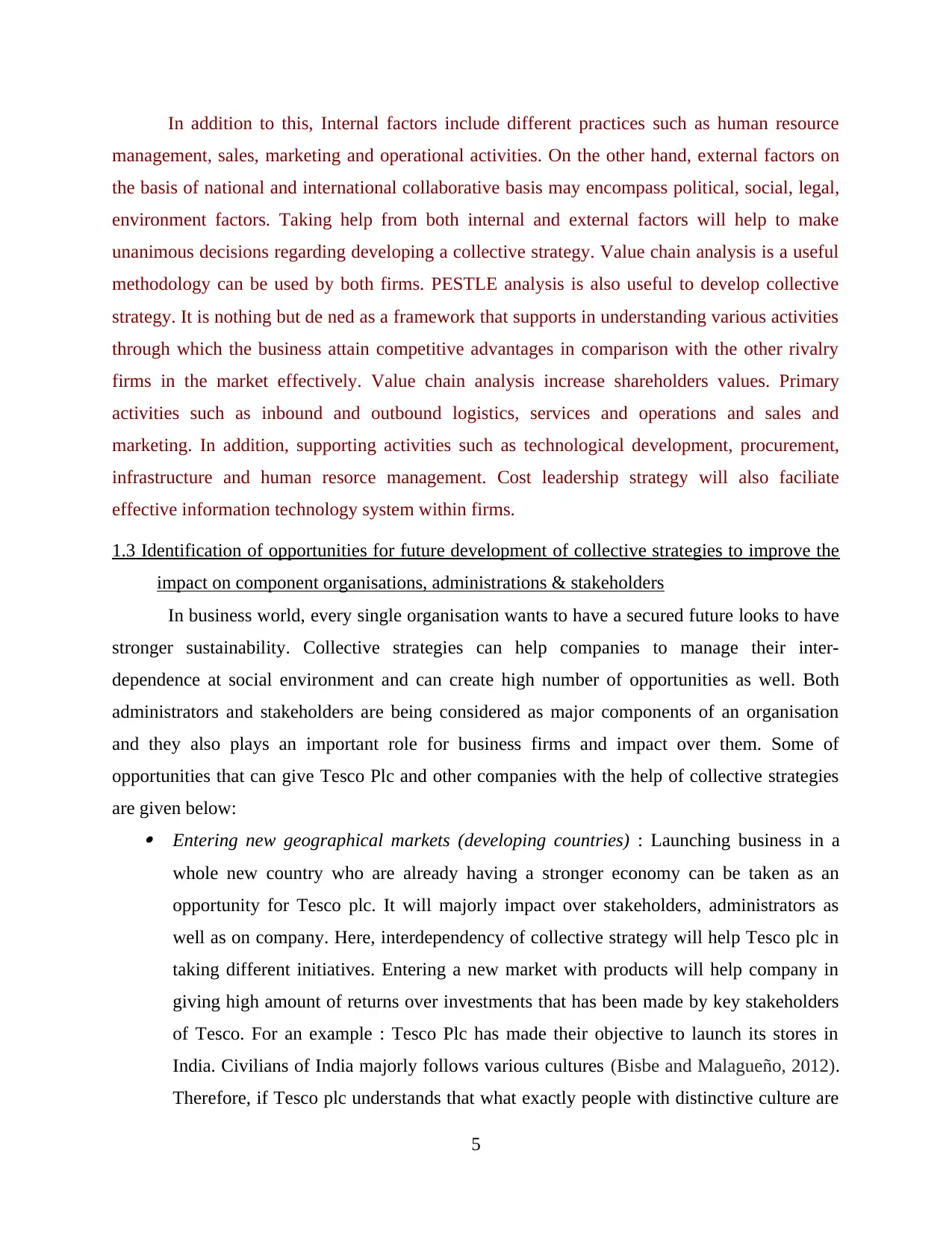
In addition to this, Internal factors include different practices such as human resource
management, sales, marketing and operational activities. On the other hand, external factors on
the basis of national and international collaborative basis may encompass political, social, legal,
environment factors. Taking help from both internal and external factors will help to make
unanimous decisions regarding developing a collective strategy. Value chain analysis is a useful
methodology can be used by both firms. PESTLE analysis is also useful to develop collective
strategy. It is nothing but de ned as a framework that supports in understanding various activities
through which the business attain competitive advantages in comparison with the other rivalry
firms in the market effectively. Value chain analysis increase shareholders values. Primary
activities such as inbound and outbound logistics, services and operations and sales and
marketing. In addition, supporting activities such as technological development, procurement,
infrastructure and human resorce management. Cost leadership strategy will also faciliate
effective information technology system within firms.
1.3 Identification of opportunities for future development of collective strategies to improve the
impact on component organisations, administrations & stakeholders
In business world, every single organisation wants to have a secured future looks to have
stronger sustainability. Collective strategies can help companies to manage their inter-
dependence at social environment and can create high number of opportunities as well. Both
administrators and stakeholders are being considered as major components of an organisation
and they also plays an important role for business firms and impact over them. Some of
opportunities that can give Tesco Plc and other companies with the help of collective strategies
are given below: Entering new geographical markets (developing countries) : Launching business in a
whole new country who are already having a stronger economy can be taken as an
opportunity for Tesco plc. It will majorly impact over stakeholders, administrators as
well as on company. Here, interdependency of collective strategy will help Tesco plc in
taking different initiatives. Entering a new market with products will help company in
giving high amount of returns over investments that has been made by key stakeholders
of Tesco. For an example : Tesco Plc has made their objective to launch its stores in
India. Civilians of India majorly follows various cultures (Bisbe and Malagueño, 2012).
Therefore, if Tesco plc understands that what exactly people with distinctive culture are
5
management, sales, marketing and operational activities. On the other hand, external factors on
the basis of national and international collaborative basis may encompass political, social, legal,
environment factors. Taking help from both internal and external factors will help to make
unanimous decisions regarding developing a collective strategy. Value chain analysis is a useful
methodology can be used by both firms. PESTLE analysis is also useful to develop collective
strategy. It is nothing but de ned as a framework that supports in understanding various activities
through which the business attain competitive advantages in comparison with the other rivalry
firms in the market effectively. Value chain analysis increase shareholders values. Primary
activities such as inbound and outbound logistics, services and operations and sales and
marketing. In addition, supporting activities such as technological development, procurement,
infrastructure and human resorce management. Cost leadership strategy will also faciliate
effective information technology system within firms.
1.3 Identification of opportunities for future development of collective strategies to improve the
impact on component organisations, administrations & stakeholders
In business world, every single organisation wants to have a secured future looks to have
stronger sustainability. Collective strategies can help companies to manage their inter-
dependence at social environment and can create high number of opportunities as well. Both
administrators and stakeholders are being considered as major components of an organisation
and they also plays an important role for business firms and impact over them. Some of
opportunities that can give Tesco Plc and other companies with the help of collective strategies
are given below: Entering new geographical markets (developing countries) : Launching business in a
whole new country who are already having a stronger economy can be taken as an
opportunity for Tesco plc. It will majorly impact over stakeholders, administrators as
well as on company. Here, interdependency of collective strategy will help Tesco plc in
taking different initiatives. Entering a new market with products will help company in
giving high amount of returns over investments that has been made by key stakeholders
of Tesco. For an example : Tesco Plc has made their objective to launch its stores in
India. Civilians of India majorly follows various cultures (Bisbe and Malagueño, 2012).
Therefore, if Tesco plc understands that what exactly people with distinctive culture are
5
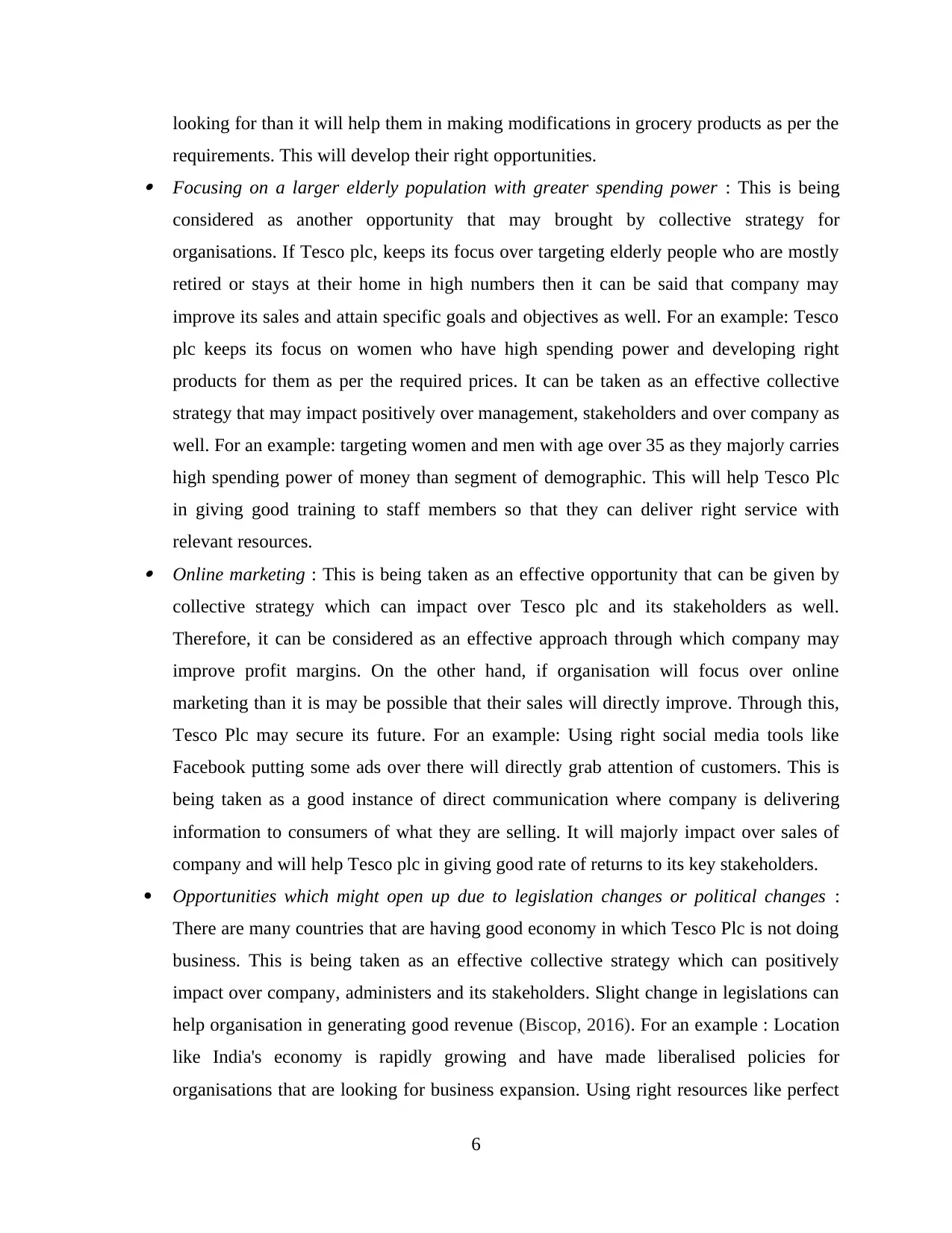
looking for than it will help them in making modifications in grocery products as per the
requirements. This will develop their right opportunities. Focusing on a larger elderly population with greater spending power : This is being
considered as another opportunity that may brought by collective strategy for
organisations. If Tesco plc, keeps its focus over targeting elderly people who are mostly
retired or stays at their home in high numbers then it can be said that company may
improve its sales and attain specific goals and objectives as well. For an example: Tesco
plc keeps its focus on women who have high spending power and developing right
products for them as per the required prices. It can be taken as an effective collective
strategy that may impact positively over management, stakeholders and over company as
well. For an example: targeting women and men with age over 35 as they majorly carries
high spending power of money than segment of demographic. This will help Tesco Plc
in giving good training to staff members so that they can deliver right service with
relevant resources. Online marketing : This is being taken as an effective opportunity that can be given by
collective strategy which can impact over Tesco plc and its stakeholders as well.
Therefore, it can be considered as an effective approach through which company may
improve profit margins. On the other hand, if organisation will focus over online
marketing than it is may be possible that their sales will directly improve. Through this,
Tesco Plc may secure its future. For an example: Using right social media tools like
Facebook putting some ads over there will directly grab attention of customers. This is
being taken as a good instance of direct communication where company is delivering
information to consumers of what they are selling. It will majorly impact over sales of
company and will help Tesco plc in giving good rate of returns to its key stakeholders.
Opportunities which might open up due to legislation changes or political changes :
There are many countries that are having good economy in which Tesco Plc is not doing
business. This is being taken as an effective collective strategy which can positively
impact over company, administers and its stakeholders. Slight change in legislations can
help organisation in generating good revenue (Biscop, 2016). For an example : Location
like India's economy is rapidly growing and have made liberalised policies for
organisations that are looking for business expansion. Using right resources like perfect
6
requirements. This will develop their right opportunities. Focusing on a larger elderly population with greater spending power : This is being
considered as another opportunity that may brought by collective strategy for
organisations. If Tesco plc, keeps its focus over targeting elderly people who are mostly
retired or stays at their home in high numbers then it can be said that company may
improve its sales and attain specific goals and objectives as well. For an example: Tesco
plc keeps its focus on women who have high spending power and developing right
products for them as per the required prices. It can be taken as an effective collective
strategy that may impact positively over management, stakeholders and over company as
well. For an example: targeting women and men with age over 35 as they majorly carries
high spending power of money than segment of demographic. This will help Tesco Plc
in giving good training to staff members so that they can deliver right service with
relevant resources. Online marketing : This is being taken as an effective opportunity that can be given by
collective strategy which can impact over Tesco plc and its stakeholders as well.
Therefore, it can be considered as an effective approach through which company may
improve profit margins. On the other hand, if organisation will focus over online
marketing than it is may be possible that their sales will directly improve. Through this,
Tesco Plc may secure its future. For an example: Using right social media tools like
Facebook putting some ads over there will directly grab attention of customers. This is
being taken as a good instance of direct communication where company is delivering
information to consumers of what they are selling. It will majorly impact over sales of
company and will help Tesco plc in giving good rate of returns to its key stakeholders.
Opportunities which might open up due to legislation changes or political changes :
There are many countries that are having good economy in which Tesco Plc is not doing
business. This is being taken as an effective collective strategy which can positively
impact over company, administers and its stakeholders. Slight change in legislations can
help organisation in generating good revenue (Biscop, 2016). For an example : Location
like India's economy is rapidly growing and have made liberalised policies for
organisations that are looking for business expansion. Using right resources like perfect
6
⊘ This is a preview!⊘
Do you want full access?
Subscribe today to unlock all pages.

Trusted by 1+ million students worldwide
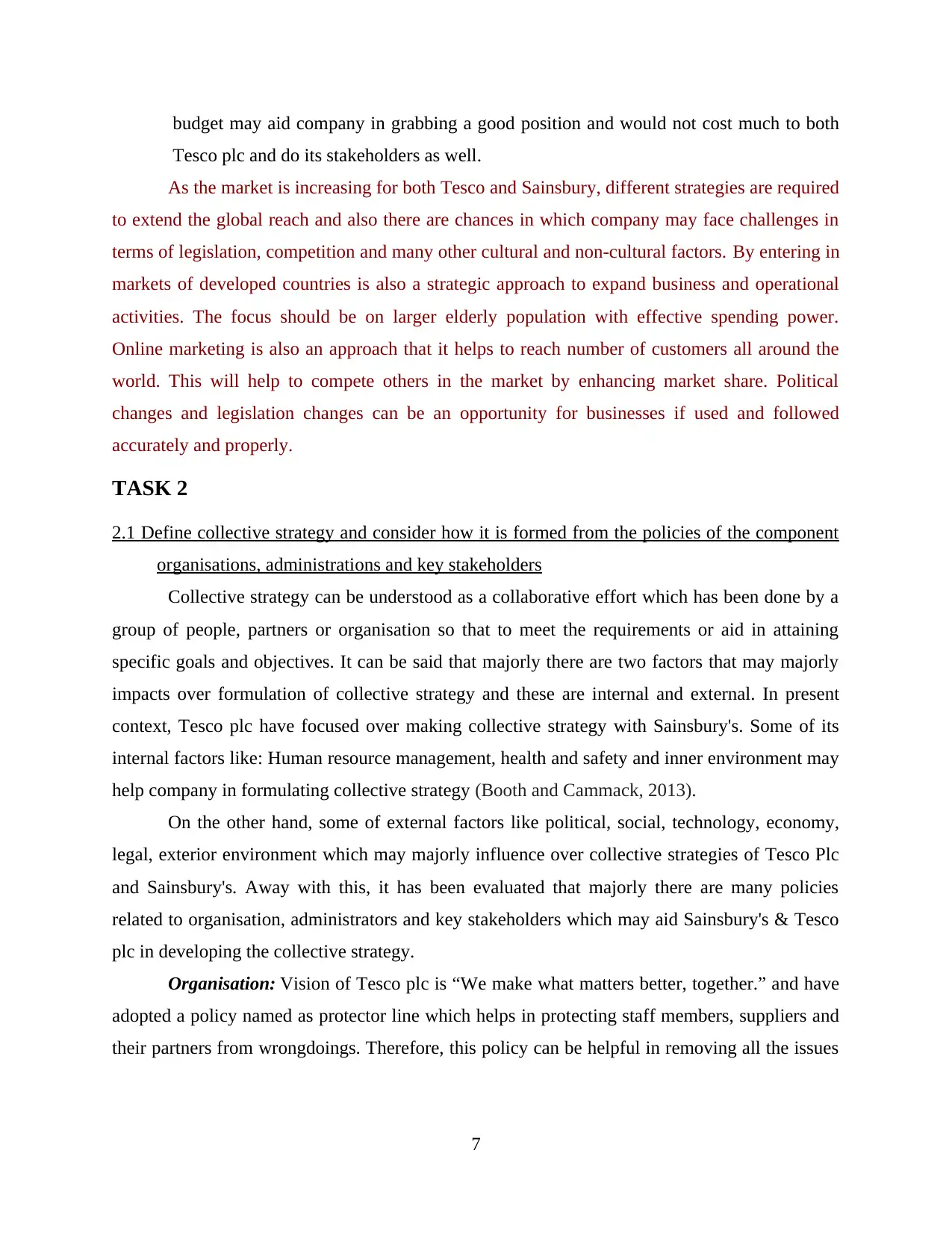
budget may aid company in grabbing a good position and would not cost much to both
Tesco plc and do its stakeholders as well.
As the market is increasing for both Tesco and Sainsbury, different strategies are required
to extend the global reach and also there are chances in which company may face challenges in
terms of legislation, competition and many other cultural and non-cultural factors. By entering in
markets of developed countries is also a strategic approach to expand business and operational
activities. The focus should be on larger elderly population with effective spending power.
Online marketing is also an approach that it helps to reach number of customers all around the
world. This will help to compete others in the market by enhancing market share. Political
changes and legislation changes can be an opportunity for businesses if used and followed
accurately and properly.
TASK 2
2.1 Define collective strategy and consider how it is formed from the policies of the component
organisations, administrations and key stakeholders
Collective strategy can be understood as a collaborative effort which has been done by a
group of people, partners or organisation so that to meet the requirements or aid in attaining
specific goals and objectives. It can be said that majorly there are two factors that may majorly
impacts over formulation of collective strategy and these are internal and external. In present
context, Tesco plc have focused over making collective strategy with Sainsbury's. Some of its
internal factors like: Human resource management, health and safety and inner environment may
help company in formulating collective strategy (Booth and Cammack, 2013).
On the other hand, some of external factors like political, social, technology, economy,
legal, exterior environment which may majorly influence over collective strategies of Tesco Plc
and Sainsbury's. Away with this, it has been evaluated that majorly there are many policies
related to organisation, administrators and key stakeholders which may aid Sainsbury's & Tesco
plc in developing the collective strategy.
Organisation: Vision of Tesco plc is “We make what matters better, together.” and have
adopted a policy named as protector line which helps in protecting staff members, suppliers and
their partners from wrongdoings. Therefore, this policy can be helpful in removing all the issues
7
Tesco plc and do its stakeholders as well.
As the market is increasing for both Tesco and Sainsbury, different strategies are required
to extend the global reach and also there are chances in which company may face challenges in
terms of legislation, competition and many other cultural and non-cultural factors. By entering in
markets of developed countries is also a strategic approach to expand business and operational
activities. The focus should be on larger elderly population with effective spending power.
Online marketing is also an approach that it helps to reach number of customers all around the
world. This will help to compete others in the market by enhancing market share. Political
changes and legislation changes can be an opportunity for businesses if used and followed
accurately and properly.
TASK 2
2.1 Define collective strategy and consider how it is formed from the policies of the component
organisations, administrations and key stakeholders
Collective strategy can be understood as a collaborative effort which has been done by a
group of people, partners or organisation so that to meet the requirements or aid in attaining
specific goals and objectives. It can be said that majorly there are two factors that may majorly
impacts over formulation of collective strategy and these are internal and external. In present
context, Tesco plc have focused over making collective strategy with Sainsbury's. Some of its
internal factors like: Human resource management, health and safety and inner environment may
help company in formulating collective strategy (Booth and Cammack, 2013).
On the other hand, some of external factors like political, social, technology, economy,
legal, exterior environment which may majorly influence over collective strategies of Tesco Plc
and Sainsbury's. Away with this, it has been evaluated that majorly there are many policies
related to organisation, administrators and key stakeholders which may aid Sainsbury's & Tesco
plc in developing the collective strategy.
Organisation: Vision of Tesco plc is “We make what matters better, together.” and have
adopted a policy named as protector line which helps in protecting staff members, suppliers and
their partners from wrongdoings. Therefore, this policy can be helpful in removing all the issues
7
Paraphrase This Document
Need a fresh take? Get an instant paraphrase of this document with our AI Paraphraser
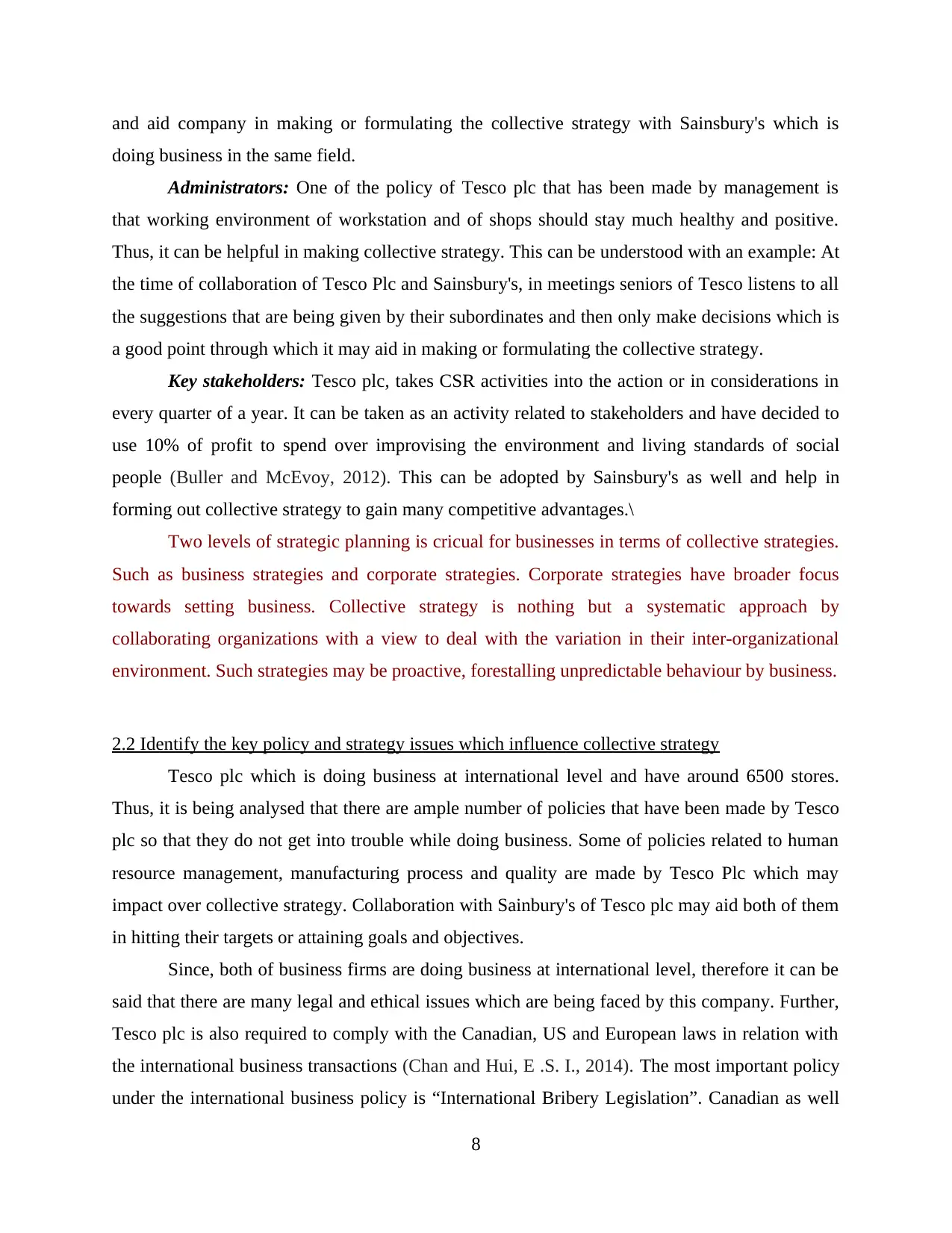
and aid company in making or formulating the collective strategy with Sainsbury's which is
doing business in the same field.
Administrators: One of the policy of Tesco plc that has been made by management is
that working environment of workstation and of shops should stay much healthy and positive.
Thus, it can be helpful in making collective strategy. This can be understood with an example: At
the time of collaboration of Tesco Plc and Sainsbury's, in meetings seniors of Tesco listens to all
the suggestions that are being given by their subordinates and then only make decisions which is
a good point through which it may aid in making or formulating the collective strategy.
Key stakeholders: Tesco plc, takes CSR activities into the action or in considerations in
every quarter of a year. It can be taken as an activity related to stakeholders and have decided to
use 10% of profit to spend over improvising the environment and living standards of social
people (Buller and McEvoy, 2012). This can be adopted by Sainsbury's as well and help in
forming out collective strategy to gain many competitive advantages.\
Two levels of strategic planning is cricual for businesses in terms of collective strategies.
Such as business strategies and corporate strategies. Corporate strategies have broader focus
towards setting business. Collective strategy is nothing but a systematic approach by
collaborating organizations with a view to deal with the variation in their inter-organizational
environment. Such strategies may be proactive, forestalling unpredictable behaviour by business.
2.2 Identify the key policy and strategy issues which influence collective strategy
Tesco plc which is doing business at international level and have around 6500 stores.
Thus, it is being analysed that there are ample number of policies that have been made by Tesco
plc so that they do not get into trouble while doing business. Some of policies related to human
resource management, manufacturing process and quality are made by Tesco Plc which may
impact over collective strategy. Collaboration with Sainbury's of Tesco plc may aid both of them
in hitting their targets or attaining goals and objectives.
Since, both of business firms are doing business at international level, therefore it can be
said that there are many legal and ethical issues which are being faced by this company. Further,
Tesco plc is also required to comply with the Canadian, US and European laws in relation with
the international business transactions (Chan and Hui, E .S. I., 2014). The most important policy
under the international business policy is “International Bribery Legislation”. Canadian as well
8
doing business in the same field.
Administrators: One of the policy of Tesco plc that has been made by management is
that working environment of workstation and of shops should stay much healthy and positive.
Thus, it can be helpful in making collective strategy. This can be understood with an example: At
the time of collaboration of Tesco Plc and Sainsbury's, in meetings seniors of Tesco listens to all
the suggestions that are being given by their subordinates and then only make decisions which is
a good point through which it may aid in making or formulating the collective strategy.
Key stakeholders: Tesco plc, takes CSR activities into the action or in considerations in
every quarter of a year. It can be taken as an activity related to stakeholders and have decided to
use 10% of profit to spend over improvising the environment and living standards of social
people (Buller and McEvoy, 2012). This can be adopted by Sainsbury's as well and help in
forming out collective strategy to gain many competitive advantages.\
Two levels of strategic planning is cricual for businesses in terms of collective strategies.
Such as business strategies and corporate strategies. Corporate strategies have broader focus
towards setting business. Collective strategy is nothing but a systematic approach by
collaborating organizations with a view to deal with the variation in their inter-organizational
environment. Such strategies may be proactive, forestalling unpredictable behaviour by business.
2.2 Identify the key policy and strategy issues which influence collective strategy
Tesco plc which is doing business at international level and have around 6500 stores.
Thus, it is being analysed that there are ample number of policies that have been made by Tesco
plc so that they do not get into trouble while doing business. Some of policies related to human
resource management, manufacturing process and quality are made by Tesco Plc which may
impact over collective strategy. Collaboration with Sainbury's of Tesco plc may aid both of them
in hitting their targets or attaining goals and objectives.
Since, both of business firms are doing business at international level, therefore it can be
said that there are many legal and ethical issues which are being faced by this company. Further,
Tesco plc is also required to comply with the Canadian, US and European laws in relation with
the international business transactions (Chan and Hui, E .S. I., 2014). The most important policy
under the international business policy is “International Bribery Legislation”. Canadian as well
8
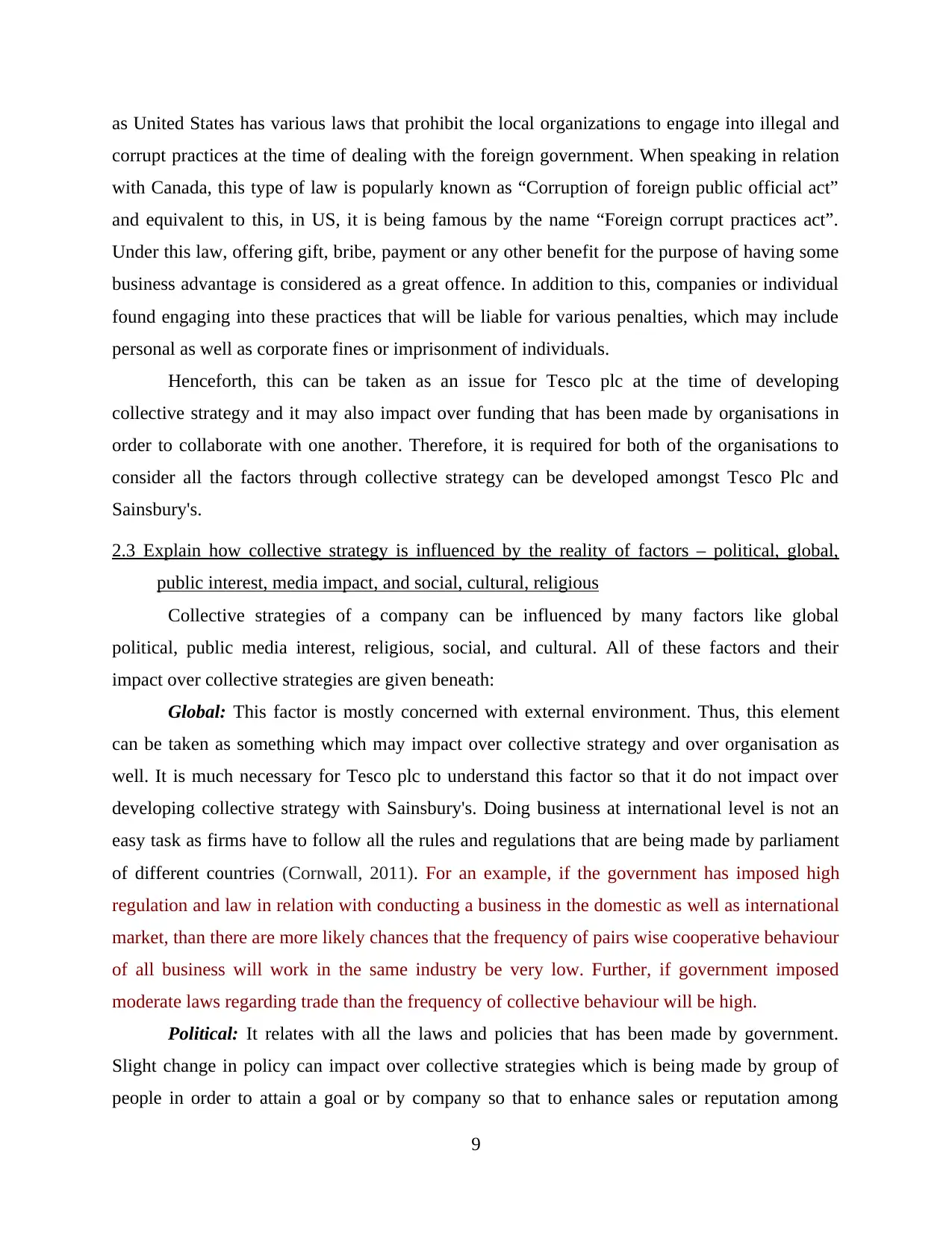
as United States has various laws that prohibit the local organizations to engage into illegal and
corrupt practices at the time of dealing with the foreign government. When speaking in relation
with Canada, this type of law is popularly known as “Corruption of foreign public official act”
and equivalent to this, in US, it is being famous by the name “Foreign corrupt practices act”.
Under this law, offering gift, bribe, payment or any other benefit for the purpose of having some
business advantage is considered as a great offence. In addition to this, companies or individual
found engaging into these practices that will be liable for various penalties, which may include
personal as well as corporate fines or imprisonment of individuals.
Henceforth, this can be taken as an issue for Tesco plc at the time of developing
collective strategy and it may also impact over funding that has been made by organisations in
order to collaborate with one another. Therefore, it is required for both of the organisations to
consider all the factors through collective strategy can be developed amongst Tesco Plc and
Sainsbury's.
2.3 Explain how collective strategy is influenced by the reality of factors – political, global,
public interest, media impact, and social, cultural, religious
Collective strategies of a company can be influenced by many factors like global
political, public media interest, religious, social, and cultural. All of these factors and their
impact over collective strategies are given beneath:
Global: This factor is mostly concerned with external environment. Thus, this element
can be taken as something which may impact over collective strategy and over organisation as
well. It is much necessary for Tesco plc to understand this factor so that it do not impact over
developing collective strategy with Sainsbury's. Doing business at international level is not an
easy task as firms have to follow all the rules and regulations that are being made by parliament
of different countries (Cornwall, 2011). For an example, if the government has imposed high
regulation and law in relation with conducting a business in the domestic as well as international
market, than there are more likely chances that the frequency of pairs wise cooperative behaviour
of all business will work in the same industry be very low. Further, if government imposed
moderate laws regarding trade than the frequency of collective behaviour will be high.
Political: It relates with all the laws and policies that has been made by government.
Slight change in policy can impact over collective strategies which is being made by group of
people in order to attain a goal or by company so that to enhance sales or reputation among
9
corrupt practices at the time of dealing with the foreign government. When speaking in relation
with Canada, this type of law is popularly known as “Corruption of foreign public official act”
and equivalent to this, in US, it is being famous by the name “Foreign corrupt practices act”.
Under this law, offering gift, bribe, payment or any other benefit for the purpose of having some
business advantage is considered as a great offence. In addition to this, companies or individual
found engaging into these practices that will be liable for various penalties, which may include
personal as well as corporate fines or imprisonment of individuals.
Henceforth, this can be taken as an issue for Tesco plc at the time of developing
collective strategy and it may also impact over funding that has been made by organisations in
order to collaborate with one another. Therefore, it is required for both of the organisations to
consider all the factors through collective strategy can be developed amongst Tesco Plc and
Sainsbury's.
2.3 Explain how collective strategy is influenced by the reality of factors – political, global,
public interest, media impact, and social, cultural, religious
Collective strategies of a company can be influenced by many factors like global
political, public media interest, religious, social, and cultural. All of these factors and their
impact over collective strategies are given beneath:
Global: This factor is mostly concerned with external environment. Thus, this element
can be taken as something which may impact over collective strategy and over organisation as
well. It is much necessary for Tesco plc to understand this factor so that it do not impact over
developing collective strategy with Sainsbury's. Doing business at international level is not an
easy task as firms have to follow all the rules and regulations that are being made by parliament
of different countries (Cornwall, 2011). For an example, if the government has imposed high
regulation and law in relation with conducting a business in the domestic as well as international
market, than there are more likely chances that the frequency of pairs wise cooperative behaviour
of all business will work in the same industry be very low. Further, if government imposed
moderate laws regarding trade than the frequency of collective behaviour will be high.
Political: It relates with all the laws and policies that has been made by government.
Slight change in policy can impact over collective strategies which is being made by group of
people in order to attain a goal or by company so that to enhance sales or reputation among
9
⊘ This is a preview!⊘
Do you want full access?
Subscribe today to unlock all pages.

Trusted by 1+ million students worldwide
1 out of 23
Related Documents
Your All-in-One AI-Powered Toolkit for Academic Success.
+13062052269
info@desklib.com
Available 24*7 on WhatsApp / Email
![[object Object]](/_next/static/media/star-bottom.7253800d.svg)
Unlock your academic potential
Copyright © 2020–2026 A2Z Services. All Rights Reserved. Developed and managed by ZUCOL.





